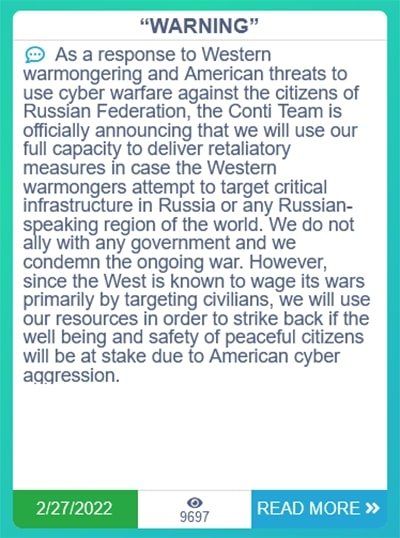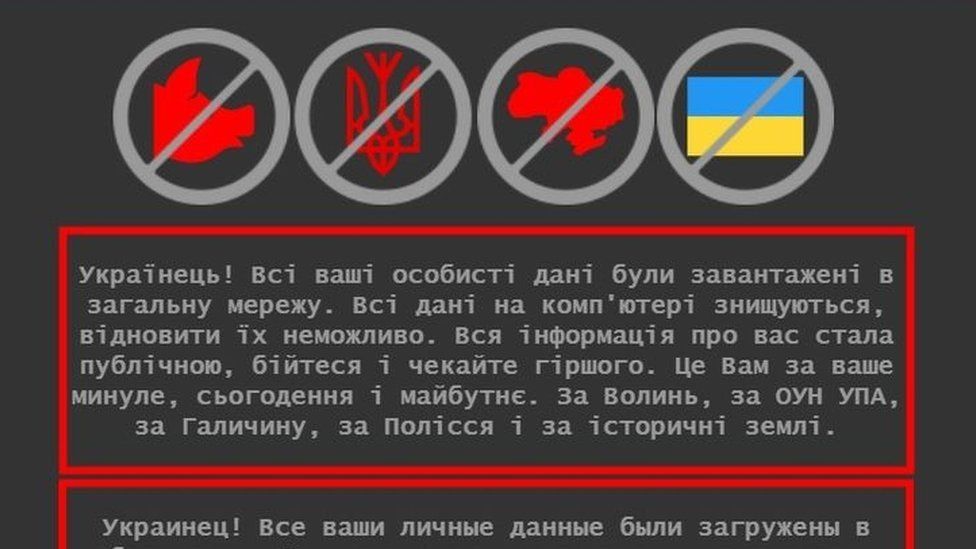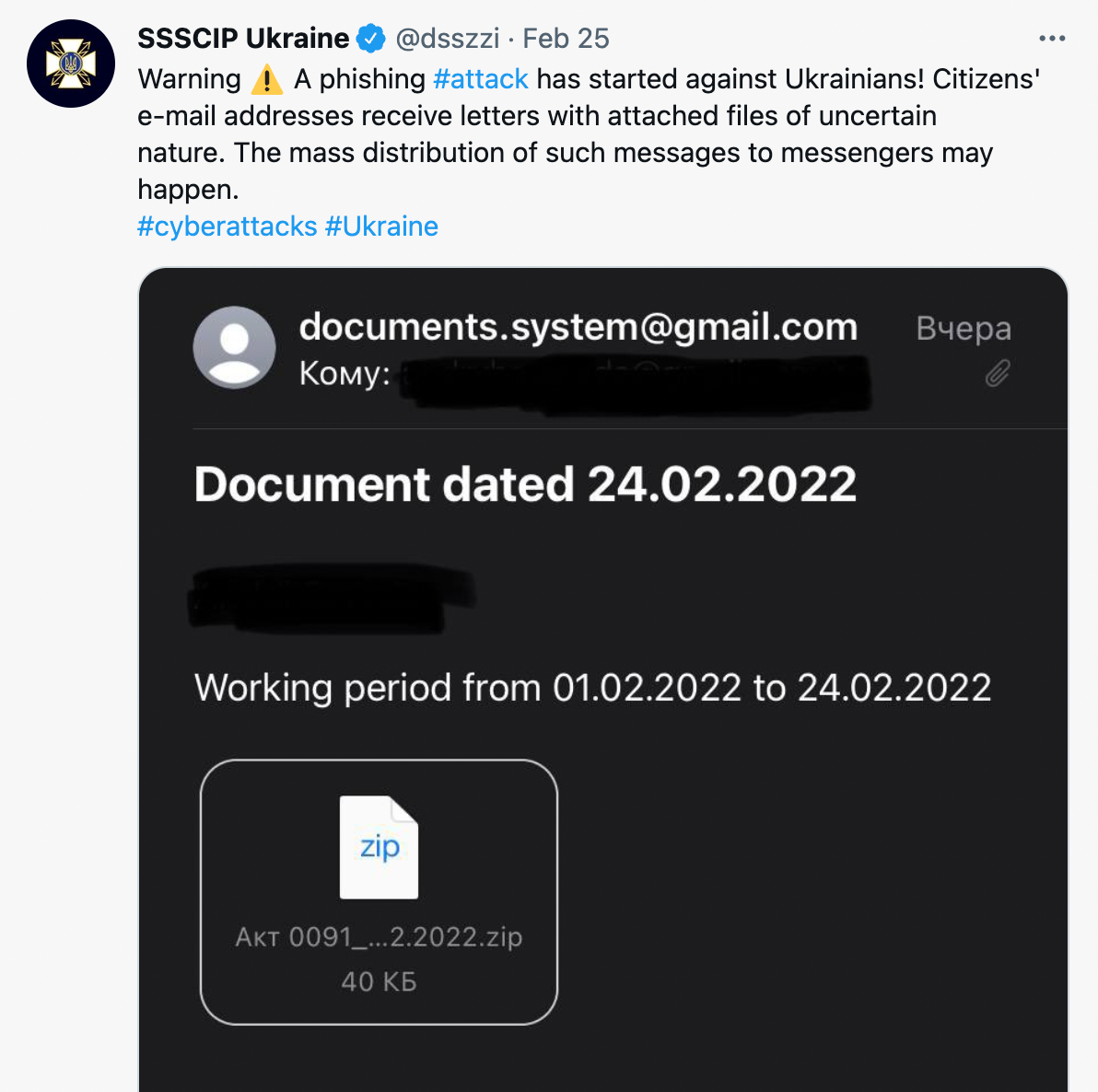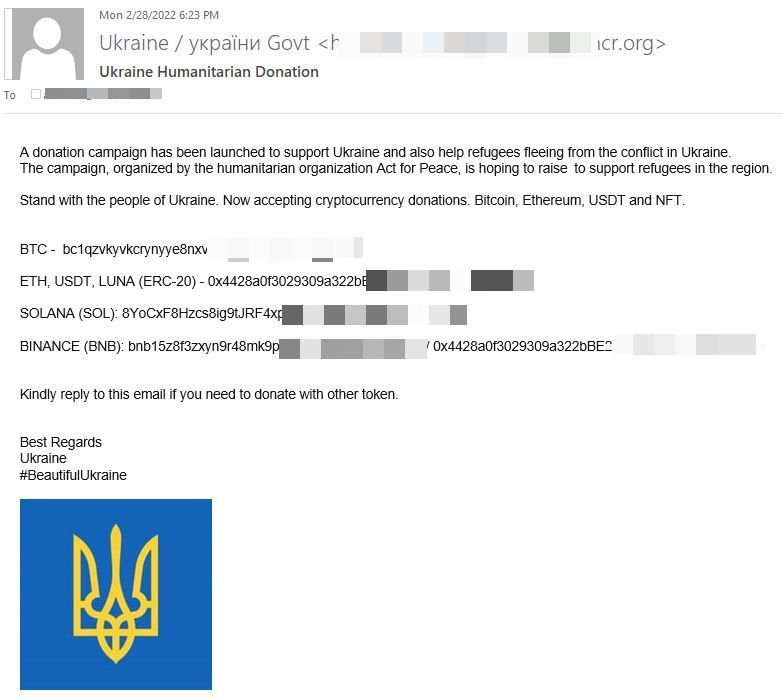Cnn 5 Things You Need to Know
Einstein once said he doesn't know what weapons volition exist used for the side by side Earth War, just he fears the war subsequently it will be fought with sticks and stones. A new globe confrontation is highly unlikely at this moment but the weapons used are as high-tech as it gets every bit some of them employ code instead of gunpowder.
As the kickoff Russian troops started rolling into Ukraine, cybersecurity experts everywhere braced for the worst -- some of the biggest cybercrime gangs in the world are known to have close ties with the Russian government and operate from so-called "hacker heavens" in the ex-Soviet infinite.
The fears came to life when the Conti ransomware group publicly pledged its back up to the Russian cause. Several Ukrainian banks and public institutions were hit by DDoS attacks and information-erasing malware, but, retaliatory attacks against western public institutions and companies have remained scarce. For now.

Is this a sign that well-nigh organizations have correctly assessed the danger and strengthened their security, or is it merely the calm before the storm?
Hither'south what we know so far:
1. For now, Ukraine is the main target
Most of the cyberattacks then far accept focused strictly on hitting Ukrainian organizations, in at to the lowest degree three separate waves:
- on Jan. 14, 70 authorities websites were defaced and taken offline, including the Ministry of Foreign Affairs and the Security and Defence Council. Even so, co-ordinate to the reports no data was leaked, and downtime lasted a few hours. Almost at the same time, the Microsoft Threat Intelligence Heart (MSTIC) reported active malware, dubbed WhisperGate, that was fabricated to expect like ransomware only lacked a recovery component. This meant it was actually designed to destroy data.
- on Feb. 15, Ukraine's two largest banks were taken offline by a massive Distributed Deprival of Service (DDoS) assault that likewise afflicted mobile apps and ATMs.
- on Feb. 23, another DDoS attack took out armed services and government sites while a data wiper called HermeticWiper was detected on hundreds of computers belonging to various Ukrainian organizations. Simultaneously, MSTIC detected a trojan dubbed FoxBlade that can surreptitiously weaponize victims' computers and use them in DDoS attacks.

Despite the obvious interest in disrupting the Ukrainian infrastructure there's no guarantee malware like WhisperGate, HermeticWiper or FoxBlade tin can't spill over to computers in other countries also. Additionally, as more countries join the sanctions against Russia, Russian-backed hackers could shift their focus and retaliate.
ii. Ukraine is fighting back
Kremlin-backed hackers may accept had the benefit of surprise, simply the cyberwar isn't one-sided at all. On the contrary, afterwards the initial shock, the Ukrainian authorities called for the associates of a volunteer It army that chop-chop started retaliating: the hacker collective Anonymous took downwards the Belarussian Railways internal network and almost 300 company websites in Russian federation. Conti'southward internal messages and source lawmaking were leaked, the Kremlin site was hacked, the Russian Nuclear Institute and the Russian Space agency suffered data breaches and Russian tv channels were hacked to show real footage from Ukraine.

3. It'south not just about companies
There's a general belief state actors simply go after companies and public institutions, but that'due south not the case. Sometimes they as well target regular people. In late February, the national Computer Emergency Response Team for Ukraine issued a alert of a major phishing entrada confronting military personnel. Even more worrying, European officials were targeted with malware in an apparent attempt to disrupt efforts to assistance Ukrainian refugees.

Whether they're looking to get together intelligence, phish for credentials or obstruct humanitarian efforts, state actors don't discriminate when it comes to targeting regular people. Even if you lot're not directly involved in the current situation, it's ever a good idea to protect your devices from malware, update them regularly, use strong passwords and watch out for scams and phishing emails.
4. There are tertiary parties taking advantage of the situation
Researchers at Bitdefender Labs picked up waves of fraudulent and malicious emails exploiting the humanitarian crisis and charitable spirit of people across the globe. The conflict in Ukraine is a gold mine for scammers and criminal groups that aren't necessarily politically involved simply love making money. One of the preferred methods is using fraudulent emails asking recipients to donate money. Scammers are impersonating the Ukrainian government, international humanitarian bureau Human activity for Peace, UNICEF, and the Ukraine Crisis Relief Fund to ask for crypto donations.

5. Cyberwar could exist the adjacent cold war
The lack of devastating attacks on western targets on the calibration of Colonial Pipeline or Kaseya doesn't mean the danger has passed. Even if the armed services conflict ends, the cyber disharmonize is likely to persist for years, and all parties involved, whether government agencies, private companies, or regular users, must come to terms with it.
Whether we similar information technology or not, cyberattacks used for sabotage or spying aren't going away anytime soon for a number of reasons: they're cheap and efficient, they tin be launched from anywhere in the world, they bring in skilful money, state responsibility is hard to show and, about chiefly, the number of potential targets is about unlimited.
For more tips, please bank check our dedicated cybersecurity guide in armed conflict zones.
In response to the armed services crunch and increased cybercriminal activity, Bitdefender & the Romanian National Cyber Security Directorate (DNSC) are offering free cybersecurity protection for any Ukrainian denizen, visitor or institution, as long as necessary.
Source: https://www.bitdefender.com/blog/hotforsecurity/five-things-you-need-to-know-about-the-cyberwar-in-ukraine/
0 Response to "Cnn 5 Things You Need to Know"
Post a Comment